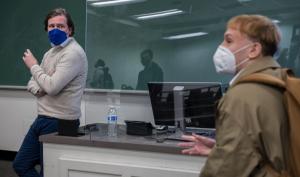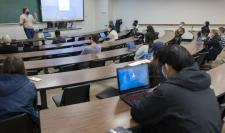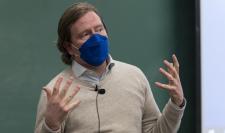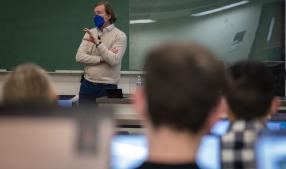
Students in the University of Virginia’s Cybersecurity and Elections course were on the edges of their seats.
In the front of their class stood the former director of the Cybersecurity and Infrastructure Security Agency, Christopher Krebs, who was fired in 2020 via Twitter by then-President Donald Trump for insisting that the presidential election was safe and secure.
Krebs’ talk last week about his past election work, as well as his current work consulting companies on cyber security issues in Ukraine, was part of a $3 million grant faculty at the UVA School of Engineering and Applied Science earned to lead a network of Virginia universities, in partnership with the Virginia Department of Elections, to train future cybersecurity professionals to protect election infrastructure. The class is a prerequisite for the Virginia Cyber Navigator Internship Program this summer.
Krebs, a 1999 graduate of UVA’s environmental sciences program, began by detailing his unique path after graduating from UVA to being appointed by Trump as the first to lead the federal cybersecurity agency, formed in 2018 under the Department of Homeland Security. The agency is a successor to the National Protection and Programs Directorate, which was launched in 2007.
After his graduation from UVA, Krebs headed south to be a scuba dive master in the Caribbean, but realized it wasn’t all it was cracked up to be, so he went back to Washington, D.C., and took a job in maritime incident response.
“This goes back years, and even through today, where I feel like I kind of get drawn to incidents. I kind of thrive in a high-stress, high-risk incidence response,” Krebs said.
One of his clients while he worked in maritime incident response was the U.S. Coast Guard, which was rolled up under Homeland Security after 9/11. Shortly after, Krebs earned his juris doctorate from the Antonin Scalia Law School at George Mason University before ending up as an employee at Homeland Security under George Bush’s administration. During the Obama administration, Krebs transitioned back into the commercial sector to take a job at Microsoft overseeing their cyber security policy in the United States.
In March of 2017, Krebs was hired as senior counselor of the secretary of Homeland Security, and later that year he was appointed as the assistant secretary for infrastructure protection under the National Protection and Programs Directorate. Several months later, he was confirmed as the director of the cybersecurity agency.


